Abstract
Wireless Sensor Networks are composed of a set of sensors distributed within an area that monitor physical variables of the environment and send back information to a central node. Nodes cannot always remain active since they would swiftly drain the system’s energy. As such, some works have proposed the use of different on/off schemes to monitor the phenomena of interest efficiently but also to conserve energy as much as possible. To this end, the use of on/off protocols has been used before, but has no relation to the characteristics of the monitored events. However, in scenarios where the phenomena to monitor occur in a certain pattern or specific region, the use of more suited techniques to activate the nodes can yield better results. In this sense, we propose the use of cellular automata (CA), based on the Game of Life (GoL), in order to turn the nodes on and off, according to the patterns described by the automata. Cellular automata are discrete models consisting of a lattice or grid of cells in a finite number of states that remain or change into another state following pre-established rules commonly associated with the states of their neighbors. As such, we propose to activate/deactivate the nodes following the natural behavior of the GoL scheme. Since the initial state of the cellular automata directly modifies the pattern evolution of the GoL, we consider several possible patterns that can occur in practical systems in order to prove the effectiveness of our proposal. We evaluate the system performance in terms of successful event report probability and energy consumption, comparing our results to the conventional on/off schemes with a certain probability of nodes being in the on state. With this premise, we think CA is a good alternative to determine the on/off process in WSNs. We compared the system performance of the GoL patterns compared to the classical approach and found the cases where the GoL scheme performs better.
MSC:
68-04
1. Introduction
Wireless Sensor Networks are composed of nodes that are distributed in an area and communicate with a central node or sink. These nodes have electronic parts like circuits, batteries, antennae, and sensors. WSNs have been extensively used for monitoring and detection in different fields, such as environmental phenomena, the military, smart city applications, and more [1,2,3]. In many of these applications, nodes are placed in inaccessible or remote locations where access is cumbersome or even impossible. As such, energy consumption is a major concern since nodes are powered up by batteries with limited energy that, when depleted, render the network non-operational. Building on this, different strategies have been used to save energy as much as possible, including schemes to turn nodes on and off in order to extend the system lifetime [4,5].
In this regard, some previous works have proposed that nodes become active (inactive) randomly with different distributions but without considering the specific nature of the event they are monitoring [6,7], or they can be programmed with some level of intelligence and determine more sophisticated schemes to turn on and off. However, this latter approach entails the use of nodes with higher processing and memory capabilities. As an alternative, we propose the use of cellular automata (CA) to determine the on/off pattern that does not require any processing but rather the monitoring of the neighbor nodes. Indeed, this proposal would reduce the need for processing tasks since they work with very simple and basic rules.
Building on this, the Game of Life is a well-known cellular automaton published by John Conway in 1970 [8]. By following simple rules for birth, death, and survival, each cell in a lattice determines its current state by observing its neighbors. This CA accurately models the interaction and evolution of simple organisms, such as cellular replication [9]. Indeed, the interaction between these organisms determines that in the future, they are born (when the conditions are favorable), they remain alive (if the environment has not changed), or they die (due to overpopulation or starvation). In this way, the state of the organisms is dictated solely by the conditions in their surroundings in a distributed manner; i.e., there is no central entity that dictates the state of the cells. Then, hundreds or thousands of organisms can cohabitate with each other, evolving as time passes with very simple rules. The evolution, given its initial configuration (i.e., initial states of every cell in the lattice), gives rise to many different emergent behaviors in the system. Hence, even if the rules are always the same, the initial configuration is a key factor for the development of the complete system for many generations and for organisms far away from the point of origin. This is a property of complex systems and has been proven to be Turing-complete; i.e., it can emulate a Turing machine, which is the paramount model of universal computation.
In this work, we propose to take advantage of such properties to model the sequence for the nodes turning on and off. Specifically, the use of the GoL entails that nodes can only turn on and off according to the state of the neighbor nodes; i.e., there is a sequence of groups of nodes located in the same region turning on and off, while nodes located further away from nodes in the off state cannot become active. As such, this proposal is not intended to work in all possible monitoring scenarios in WSNs but rather in situations where the phenomenon to monitor is moving or varying in the region of interest in a restricted manner, in this case, based on the active cells provided by the initial configuration of the GoL scheme. In this way, nodes can decide to turn on and off based on very simple rules (reducing complexity and implementation costs) while providing acceptable event detection, as we explain in further sections.
Building on this, the application of the GoL scheme in WSNs depends on the position and functions of the nodes in the region of interest. Sensors have a detection radius; emulating the physical capabilities of wireless sensors in this CA scheme, we map it to its n-neighborhood. For this work, we consider that nodes can be in three possible states regarding the sensing and communication tasks: (a) Idle: The node is active and can receive instructions and data but is not performing any specific activity; as such, in this state, the node consumes the lowest amount of energy. (b) On: The sensor is active and is able to detect events; therefore, the node consumes more energy than in the idle mode, because it is monitoring its surroundings. (c) Transmitting: The sensor is active and has detected an event and is transmitting the information to the sink node; then, the node consumes the highest amount of energy. In this sense, we assume that nodes are placed in the center of each square in the lattice, and their sensing range is also limited to these squares. Even if this is not a common assumption, we believe that it would produce some preliminary results to assess the benefits of the use of CA in the design of WSNs. Also, events are the physical phenomena that the sensors can detect. Events can occur randomly in the area of interest, even if they only occur in certain regions.
Our proposal is very sensitive to sensor placement in the grid in the sense that each node installed in the region of interest reacts to the neighbor activity according to the GoL rules. In this regard, if a node is not placed in the specific pattern pathway, it may never turn on, becoming completely useless to the monitoring tasks, or worse, it can interfere with the pattern and produce a different pattern that propagates to other regions or lose the periodicity. As such, a misplaced node may produce activity in areas not intended by the system administrator or turn off all nodes after some time. Hence, our proposal is only intended for very specific cases where (a) nodes cannot be moved and (b) nodes are placed in very specific locations. We are well aware that this is not the common use of WSNs, but in cases where it is possible, the use of cellular automata renders important energy savings. When this is not possible, the use of common on/off patterns is advisable.
First, the monitored phenomena must be restricted physically to the GoL pathway, for example, restricted by walls, riverbanks, or vehicles on roads (but more in the sense of driveways and not on highways due to the extension of the region of interest, considering that nodes have to be placed in specific locations). Second, they are restricted by time, in the sense that the GoL pattern evolves in time. The idea would be to evolve at the same time as the phenomena, but not necessarily since the GoL would repeat again. Hence, the monitored event can be evolving slower than the GoL pattern and still be accurately observed, but not faster, since it would leave the monitored path faster than nodes turning on.
In this sense, the use of our proposal in flooding, where water is physically restricted to roads in cities and the fluid dynamics are known, may prove to be an ideal case of study. Also, human or animal intruders in hallways, alleys, and bridges may also be a good example where our proposal works adequately. In this case, the intruder may walk at a random speed, but due to the periodicity of the GoL it can still be detected. Another potential application is in domotic scenarios, where pets (dogs, rabbits, and turtles, for instance) are set loose or escape and follow well-known trajectories; in this case, there may not be a physical barrier, but we all know that these home companions are very predictable in certain cases. Hence, GoL-based WSNs would be very helpful in providing timely alerts for these events.
Given this, the main contributions of our work are as follows:
- Provide clear guidelines on using cellular automata in the design of WSNs.
- Use of the Game of Life scheme as a tool to reduce energy consumption in WSNs that provides an acceptable event detection probability.
- Mathematically analyze the system performance that can be used irrespective of the initial configuration of the GoL scheme.
- Model different scenarios and environments to be monitored using cellular automata, using the provided information to set nodes on and off.
The remainder of this work is organized as follows: In Section 2, we provide some relevant previously published works related to our proposal. Then, in Section 3, we present the system model in detail, including our work’s limitations and main assumptions. In Section 4, we dwell on the Game of Life cellular automaton and explain how it can be used in the context of WSNs. After this, in Section 5, we develop a mathematical analysis to study and design WSNs based on the Game of Life. We also develop a simulation of the system to validate the analytical results, as depicted in Section 6. We finally present some relevant results using different initial configurations of the Game of Life algorithm and provide some insights into the system’s performance and design. We end this paper with our conclusions.
2. Literature Review
In this section, we discuss some of the most relevant previous works related to our proposal.
In a work about using a custom CA on a Blockchain as a means to create AGI (Artificial General Intelligence, a hypothetical artificial intelligence able to match or surpass human intelligence) [10], the authors allude to the Simkin glider gun pattern as an example of a Universal Contructor, i.e, a Turing-complete CA (a cellular automaton capable of simulating a Turing machine) with emergent properties. In another paper on using CA on an FPGA for hardware acceleration [11], Simkin and glider patterns were used in their experiments. In another study of Turing-complete properties of CA [12], the period-60 glider gun is one of the patterns observed in the process of their Universal Register Machine. Using an extended version of the GoL [13], considering biological traits, the authors found different period gliders that arose from this model.
Regarding WSNs with an on/off scheme, a work on IoT [14] concludes that it is useful for shorter distances, and their proposal is using this on/off strategy combined with antennae covering almost the entire area. A more technical piece [15], also on IoT, uses the WSN on/off scheme but compares the physical elements, i.e., the transmitters (Bluetooth, BLE, and Wi-Fi). A work [16] about a smart irrigation system uses sensors to decide whether or not to turn on a water pump but does not mention if sensors are being turned on/off or if they stay on all the time. In a paper [17] more related to ours, they scatter the sensors and turn them on/off using a fuzzy logic system based on their energy levels and how far they are from the central node.
Among relevant recent related works using CA-based schemes for WSNs, but not GoL-based ones, Shahid et al. [18] use a trust-based CA to detect and prevent energy-drainage attacks. Banerjee et al. [19] employ a clustering scheme around a cyclic CA for energy conservation. Sen and Banerjee [20] use a CA-based security algorithm for a WSN. Maity et al. [21] utilize a CA-based scheme for identifying faulty nodes of a WSN. Fu et al. [22] adopt a 2D CA to mimic the failure process of a WSN. Hoffman et al. [23] present work for finding CA rules to cover 2D space, similar to our proposal, when events are localized, but differ in that we consider the behavior of the physical phenomena over time. Also, the article by Reyes et al. [24] uses the GoL for a WSN, but they focus on energy efficiency using a routing method based on the former. They do not use an initial configuration set on a specific pattern but a randomized one. They only consider a Die Hard configuration, a kind of Methuselah (a pattern that takes a large number of generations to stabilize) that lasts for a considerable number of generations before disappearing. They do not focus on the initial pattern because their sensors are distributed uniformly or randomly in a grid. Our proposal considers specific initial configurations for four stable patterns of the Game of Life; that is, they do not disappear. We also consider a randomized one for control. Also, they do not focus on the GoL as an alternative for the common probability-based turning on/off scheme. They apply the GoL rules for each sensor because they are set as a grid. We let the sensors be placed randomly, and because of this, we make use of a meta-lattice for representing empty spaces as active ones, not requiring filling the physical area with sensors.
3. System Model
In this section, we explain in detail the system model, including the main assumptions of the proposed analysis. We consider a WSN deployed in a two-dimensional square lattice where sensor nodes can only be placed at the points of the lattice. As such, we propose a WSN where nodes are placed in very specific locations, unlike common WSNs where nodes are placed randomly [14,17]. Building on this, this work aims at very specific applications of WSNs. First, the number of nodes cannot be arbitrarily high due to the implementation limitations, such as time, workforce, and placing each node in its dedicated point. Second, the monitored region must allow the placement of the nodes in the specific point marked by the lattice. Otherwise, the GoL pattern will not evolve where the node is located, and the efficiency will be reduced. Such applications include but are not limited to intruder detection in outdoor locations (gardens, hallways, etc.), intelligent agriculture, and playground monitoring, among others. For instance, in indoor applications, this may be cumbersome since furniture, columns, and such may prevent the installation of nodes at precise points. Also, it may be impractical in a large forest environment since the number of nodes would be very high to cover such locations. The reason for the use of the square lattice is to mimic the development of the GoL, which usually evolves in such geometric structures, where the rules for the cells (squares in the lattice) to live or die are given according to neighboring cells. As such, the main proposal is to locate the nodes in the lattice where the GoL will evolve, i.e., those placed on the squares where cells will be active at some point in the GoL pattern.
In our case, the GoL pattern is related to the event to be monitored. That is, we consider certain events that have a movement pattern that can be described by a particular configuration of the GoL, because the event (an intruder, a fire, a water leak, or similar phenomena) either moves in the same direction or speed and/or has the same extension (number of covered cells). In this work, we consider that events have an exponentially distributed random duration inside the region of interest. This is mainly for simplicity reasons, but our analysis can be easily extended to other distributions in future works.
Then, depending on the initial configuration of the CA, the activation pattern is different and is located at different points of the monitored area. Hence, nodes will be placed at random points inside this activation pattern. Also, we assume that nodes have a detection radius of a cell. Since nodes are considered to be placed in the center of the cell, when an event occurs in a cell with a sensor in it, i.e., the cell is alive according to the GoL algorithm, then it can be detected; if the cell is dead (the node is in the off mode), then the event occurring in that cell cannot be detected.
As a visual example in Figure 1, we display the evolution of a ‘glider’ pattern for its four-period pattern. The alive cells are in black, the empty cells in white, and the red point represents the center of the random event occurring in the lattice. In Figure 2 the gray cells are the ones where the GoL pattern occurs and the white cells are where the pattern never happens. This sensormap is our basis for our localized/unlocalized experiments.
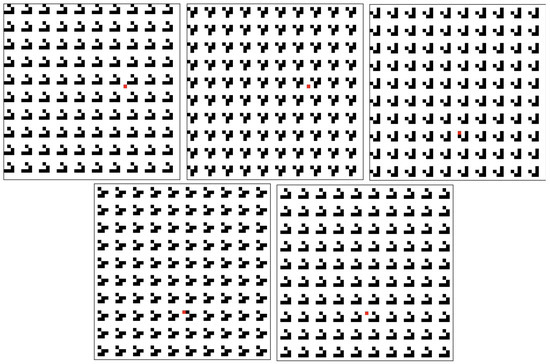
Figure 1.
Evolution of a ‘glider’ 4-period pattern, i.e., the pattern repeats every 4 generations, as observed in the image progression. The red dot is the random event in the lattice.
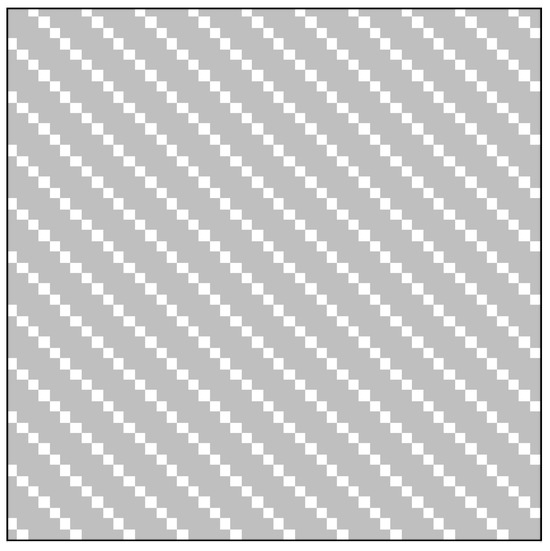
Figure 2.
Sensors can only be placed where the pattern occurs. As seen in the previous figure, the pattern covers some space of the lattice (gray area) but there is some space where cells never become active (white area).
Every sensor has a detection radius that is the n-neighborhood (following a Moore Scheme, as seen in Figure 3) where it can detect events and power consumption levels for transmitting, on, and idle. Following the common Moore n-neighborhood definition, we consider the sensor detection radius to be the Chebyshev distance, i.e.,
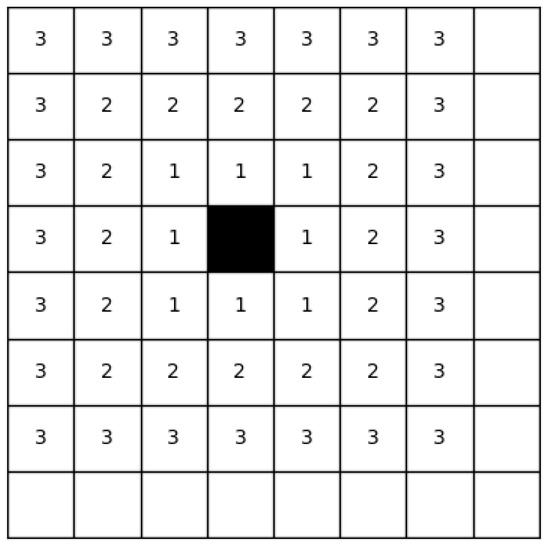
Figure 3.
Example of a Moore Scheme. The black cell is the one currently considered. With respect to each cell, it is at a distance from it, labeled by a number. The immediately surrounding 8 cells at distance 1 are the 1-neighborhood, the 16 cells at distance 2 are the 2-neighborhood, and so on. We use this common cellular automata neighborhood scheme as our detection radius.
As we have said before, the typical approach for turning sensors on/off is using an associated probability. Our scheme uses the Game of Life evolution of an initial configuration set in the meta-lattice. When a point in the meta-lattice is in the “alive” state, if a sensor exists in the corresponding point in the sensor lattice, this turns on; otherwise, if it is in the “dead” state in the meta-lattice, it turns off in the sensor lattice.
The reason for considering both placement and scheduling according to the GoL pattern is that if only the scheduling is varied, nodes outside the GoL dynamics are useless since they would never turn on, given that the conditions in their surroundings would never be met for them to become active. As such, we considered only placing nodes where the GoL occurs. Also, the effects of only the scheduling, leaving nodes that are never turned on, are not clear since there is energy wastage from “useless” nodes, and we considered that, for practical issues, there is no gain in installing nodes that would never sense data since events can only occur in a restricted area.
4. Game of Life Model
In the previous section, we mentioned that the GoL can be used to mimic certain events that can occur in the monitored area by the WSN. Hence, sensors are placed in the trajectory of such events, which evolve according to the GoL algorithm. This section provides further details on the GoL dynamics based on its initial configuration. Formally, the Game of Life model is a tuple with the following components:
- is a d-dimensional lattice;
- S is the finite states set;
- N is the neighborhood scheme;
- is the transition function.
A configuration is any function .
The Game of Life rules are as follows:
- Birth: A dead cell with exactly three live neighbors becomes alive.
- Survival: A live cell with two or three live neighbors survives.
- Underpopulation Death: A live cell with fewer than two live neighbors dies.
- Overpopulation Death: A live cell with more than three live neighbors dies.
According to the initial configuration, the automaton cells will evolve differently. Some patterns repeat cyclically while others converge to a final static state where no more cells can be born or die. For our study, we used the patterns known as gliders, Gosper gun, period-60 Gosper gun, and Simkin glider gun. The reason for this is that these GoL patterns closely resemble different dynamic events found in WSNs. Indeed, since only neighbor nodes become activated, i.e., the possible event occurs only in a certain region at the time, and the pattern evolves in a certain direction, these patterns can model the intruder (human or animal) movement in a closed facility. Also, they can model fire propagation or fluid movement due to a leakage or flooding, among others. As such, knowing that the monitored event closely resembles the dynamics of the GoL pattern, we propose that nodes also become active according to this pattern since there is no gain in having nodes in the on mode when the activity is far away. By only activating nodes in the region predicted by the GoL, we effectively reduce energy and increase the system throughput by reducing potential packet collisions from nodes reporting data where no events are occurring.
In Figure 4, Figure 5 and Figure 6, we show the patterns mentioned above, the main characteristic of which is that they cover most of the grid in a directional manner; i.e., there is a sequence of events occurring in the region of interest, mimicking an intruder’s movement or other possible events. Also, the movement is restricted to certain cells, which is useful for determining the position of the nodes. Indeed, nodes are no longer placed randomly in the monitored area but rather are strategically placed where the event is supposed to occur.
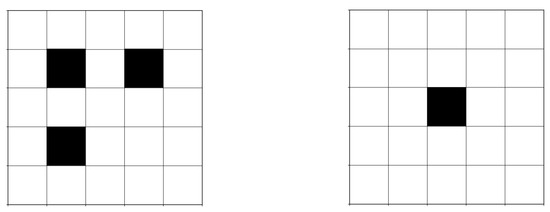
Figure 4.
In this simple example, the white central cell (in state 0 or death) changes to black (in state 1 or alive) following the birth rule, i.e., exactly 3 neighbors alive or in state 1. In turn, its black neighbors change to white by the underpopulation death rule, i.e., less than 2 neighbors alive.
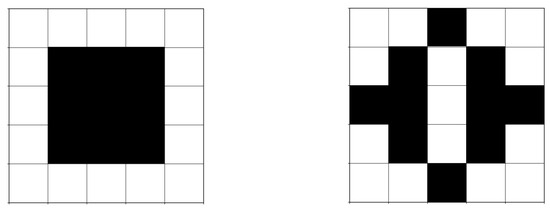
Figure 5.
An example of the overpopulation death rule with the central black nodes in the first image turning from black to white. The left and right row stay black by the survival rule. Also new cells become active by the earlier mentioned birth rule.
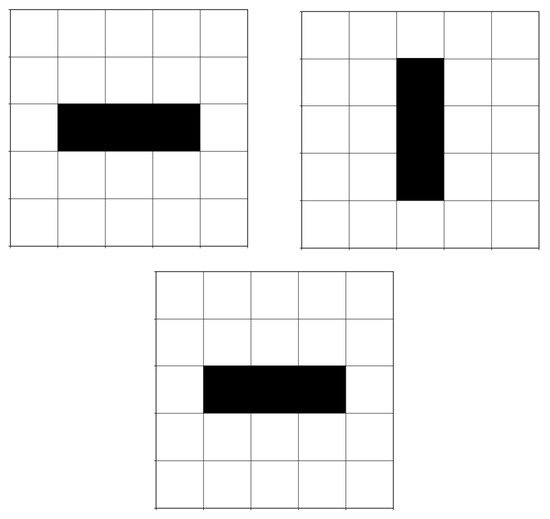
Figure 6.
A simple example of a stable period-2 oscillator; i.e., the pattern returns to its first configuration after 2 generations and becomes stable because it will continue repeating as long as it is not affected by any other pattern. The central node is permanently 1 by the survival rule, and its neighbors keep switching between 0 and 1 by the death and birth rules.
Building on this, it is clear that this proposal is not adequate for general WSNs. It is aimed at situations where the event to be monitored is well known and we have information on the moving pattern. Hence, events that occur randomly in the region are not well-suited. Also, if the abnormality suddenly behaves differently than expected, it will cause events to be no longer reported adequately. Conversely, if the abnormality behaves as expected, the on/off pattern of nodes in the WSN will consider the specific nature of the event and the performance of the system will be improved compared to a generic on/off scheme. Finally, not all GoL patterns are suitable for determining the on/off pattern of nodes since they may not represent possible events in the system. However, many other patterns can still be investigated in future works.
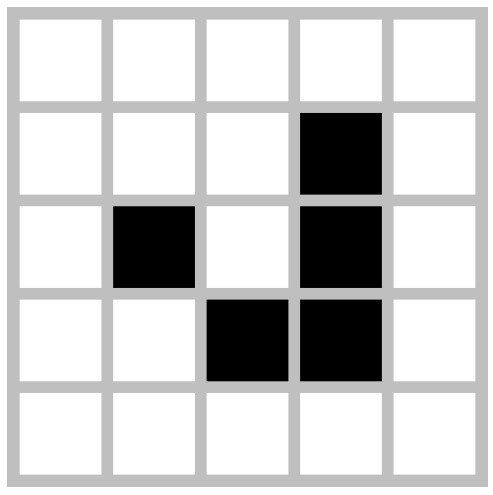
Figure 7.
The initial configuration for a glider. For this pattern we fill the lattice with gliders that move across the lattice without overlap. This 4-period pattern is one of the oldest discovered.

Figure 8.
The initial configuration for a Gosper glider gun. This period-30 pattern is also one of the oldest discovered. It has static elements on both sides with a central dynamic that generates gliders.
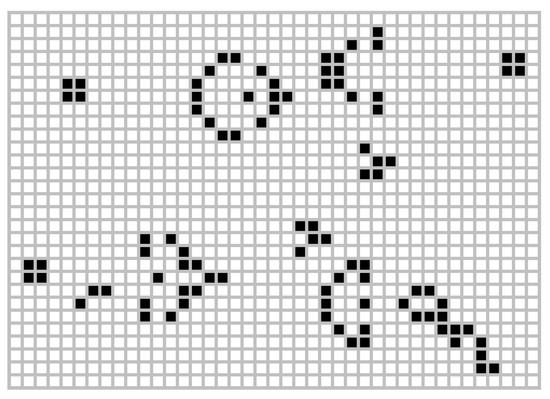
Figure 9.
The initial configuration for a period-60 Gosper glider gun. This pattern consists of two Gosper glider guns that generate gliders by the central interaction of more cells. It has a wider central dynamic than the original Gosper gun.
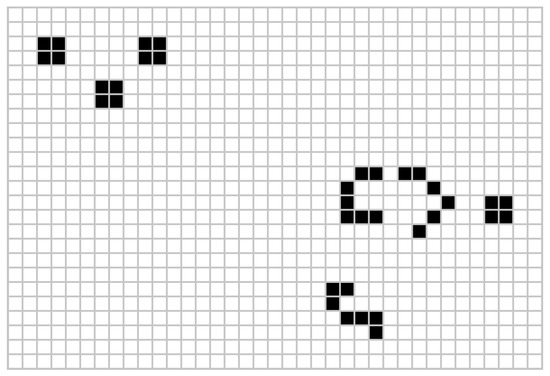
Figure 10.
The initial configuration for the Simkin glider gun. It has an interesting central dynamic that generates one glider leaving the lattice upside and another downside.
The choice of the GoL over simpler linear CA is because of the natural mapping of WSNs as two-dimensional limited spaces. The GoL has been studied for decades and a vast amount of patterns have been discovered and continue to be discovered that can be adapted for physical phenomena, presenting a smarter alternative to the standard WSN approach of turning sensors on/off based on a timed probability.
5. Mathematical Analysis
In this section, we derive a mathematical analysis to investigate the system performance of the WSN when nodes turn on and off, either using the GoL patterns or in a random manner. In this work, we consider a square lattice formed by cells that represent the sensing area of sensor nodes, (i.e., the total sensor nodes). Nodes are randomly placed in the monitored area as follows: We consider N nodes (the total of the lattice area) in the system deployed randomly in the cells. Specifically, each cell has a probability of having a node given by
If a GoL pattern is considered, then nodes are only placed in the cells where the cellular automata evolve; otherwise, nodes are deployed in all cells of the region of interest.
Also, we consider that events remain active in the monitored area for an exponentially random distributed time with variable parameter , and the event inter-arrival time is also exponentially distributed with parameter . Hence, the probability that there is an event in the system can be calculated as follows:
where and .
Nodes turn on and off according to the dynamics of the different GoL schemes. As such, we can calculate the probability that a node is active (on), , or inactive (off), , directly from the GoL patterns.
Table 1 is a sample of experimental values of the selected patterns with localized and unlocalized events. These values are the means of repetitions of the experiments with a randomized number of sensors, sensor detection radius, and localization following GoL evolution. Because the lattice can be of variable size and our focus is on the practical aspects of the GoL, for the time being we are not calculating an analytical value.

Table 1.
Sample considering the same number of sensors and detection radius.
Conversely, for the conventional case, where no CA is considered, we establish an arbitrary probability of nodes turning on and off, given by . Building on this, the probability that a node successfully detects an event can be calculated as follows:
As can be seen above, a sensor node detects an event when there is an ongoing event, there is a sensor node in the cell where such an event occurs, and the node is active to take measurements of its surroundings. Substituting the previous expressions, we get
We also derive the average energy consumption in the system by considering the possible states of the nodes, according to the event occurring in the region of interest. Specifically, we assume that sensors can be in three states:
- Off or idle. In this state, the sensors consume the lowest energy levels since most of the electronics are in low energy consumption mode. Hence, nodes cannot take measurements of their surroundings nor communicate with other nodes. The energy associated with this state is energy units per step of the CA.
- On. Sensors are active and consume considerably more energy because most of the electronics of the nodes are up and running. Nodes can communicate with other nodes and actively take measurements within their detection radius. The associated energy is energy units per step of the CA.
- Transmitting. Sensors are on and have detected an event. As such, nodes are transmitting data packets to the central node (sink node) and they consume the highest amount of energy, expressed as energy units per step of the CA.
For calculating the mean energy consumption , we need to consider the energy of each set of sensors in each state. Say N is the total of sensors, the subset of transmitting sensors, and the subset of sensors on but not transmitting; the remaining sensors are therefore idle. Energy consumption is given as
For the energy consumption units, we assume that , , and are equal to 1, 0.9, and 0.01, correspondingly. These values are representative and normalized to the energy consumed in the transmission mode in such a way as to easily scale to the specific values of the commercial nodes used in a practical setting.
The reason for this is that in many commercial nodes, such as Raspberry and Microchip nodes, the energy consumed for transmitting is similar to and slightly higher than that of nodes processing data but not transmitting. Hence, Etr and Eon are selected in this way to reflect this case. However, nodes in low energy consumption mode consume much lower energy levels, in this case, two orders of magnitude lower. However, we have now included new results to show different cases to show the validity of these assumptions.
We assume independence of the following events: is determined only by the activity of the monitored phenomena; it is not related in any way to the sensor placement or the GoL dynamics. is the probability that there is a sensor in the square where the event is occurring. This placement is performed at the setup phase of the WSN. As mentioned, sensors are placed uniformly in the squares where the GoL pattern occurs. As such, there is no relation between the ongoing event and the sensor location. Finally, the probability that a node is on is clearly dependent on the GoL pattern but not on the ongoing event. Recall that nodes are turning on and off not as a consequence of the event but as a preprogrammed schedule given by the GoL dynamics. As such, the dependence on nodes turning on and off is only reflected in the value of (i.e., the probability that a node is on directly depends on the state of its neighbors), which we find computationally, but the events, the placement of the nodes, and the duty cycle are independent events.
6. Simulation Model
In this section, we explain in detail the simulations developed to verify the mathematical analysis. We use bidimensional arrays to determine the position of both the nodes turning on and off according to the evolution of the GoL scheme and the events in the region. Each site acts as a point of the lattice. For these simulations, we first initialize the system variables, such as the event occurrence probability and the detection radius. We use localized events (which can only happen within the GoL pattern evolution) and unlocalized ones for the position of the random events in any part of the lattice. Localized events can be useful for physical phenomena that behave similarly to a GoL pattern (e.g., Gosper gun, which has a central dynamic with a glider escaping the lattice in the lower right corner, can represent some animal movement or intruders in a restricted area). We also use non-localized events that do not follow any GoL pattern in order to evaluate the system performance of our proposal when general events occur.
We employ different initial configurations for the meta-lattice (the GoL cellular automata pattern) and use a conventional on/off process in a WSN model with different activation probabilities, , for comparison purposes. We perform n = 1,000,000 iterations of the simulation for our experiments because it is a sufficiently high number to obtain statistically representative results for the average power consumption and the detection probability of the random events. Also, the system enters a stable state after this number of iterations.
These simulations are developed in C++. We now briefly describe the structure in the following algorithms. This auxiliary function generates sensormaps that are used for localized events following the evolution of GoL patterns. The GoL evolves from generation to generation until the pattern is repeated. The number of generations after returning to the initial pattern constitutes a period. Then, the meta_lattice records the number of times that a cell was alive at the (i, j) position in the lattice. Sensormaps are only possible for known patterns that repeat, i.e., periodic patterns. With the corresponding sensormap, the events can be forced to occur along the GoL trajectory.
Sensors in their corresponding lattice have the following values:
- 0—there is no sensor in place;
- 1—a sensor exists in idle state;
- 2—a sensor exists in on state;
- 3—a sensor exists in transmitting state.
Algorithm 1 determines the sensormap of each GoL pattern, that is, the positions in the lattice where the cells activate (and the number of times that each cell turns on before the pattern repeats). For this, we run the common GoL and count each occurrence, adding 0 or 1 to each position. As these patterns have a well-known period (unlike a random pattern), we run the algorithm only for the needed generations before the pattern repeats.
| Algorithm 1: Generate sensormap: auxiliary array with the possible locations of active nodes following the evolution of determined GoL patterns for localized events |
Let meta_lattice:Array[m][n], sensormap:Array[m][n] For g = 1, 2,…, generations For i = 1, 2,…, m For j = 1, 2,…, n Evolve meta_lattice[i][j] Add value (0 or 1) to sensormap[i][j] Endfor Endfor Endfor |
Algorithm 2 is used for setting up the lattices (arrays) and also determines the location of each sensor in the meta-lattice. These sensors can be set randomly or only where a GoL pattern occurs (sensormap).
| Algorithm 2: Initialize sensor and meta-lattices |
Let meta_lattice:Array[m][n], sensor_lattice:Array[m][n] For i = 1, 2,…, m For j = 1, 2,…, n Set pattern for meta_lattice[i][j] Endfor Endfor While sensors_in_place < sensors For i = 1, 2,…, m For j = 1, 2,…, n If (localized) Add sensor randomly sensor_lattice[i][j] only if exists in sensormap[i][j] sensors_in_place++ Else Add sensor randomly sensormap[g][i][j] sensors_in_place++ Endif Endfor Endfor Endwhile |
Algorithm 3, the main logic of our simulation, is as follows: it is the traditional Game of Life algorithm; as such, we consider a toroidal/periodic boundary (i.e., the upper and bottom and left and right bounds are connected, as shown in Figure 11).
| Algorithm 3: Evolve |
Let meta_lattice:Array[m][n], sensor_lattice:Array[m][n] Let power_consumption, detection_probability For g = 1, 2,…, generations Initialize meta_lattice, sensor_lattice For i = 1, 2,…, m For j = 1, 2,…, n Check nearest neighbors of and current status of meta_lattice[i][j]. Evolve according to GoL rules If (sensor_lattice[i][j] and its sensoring area can detect random event) Add to detection_probability Add power consumption of sensor_lattice[i][j] Endfor Endfor Endfor |
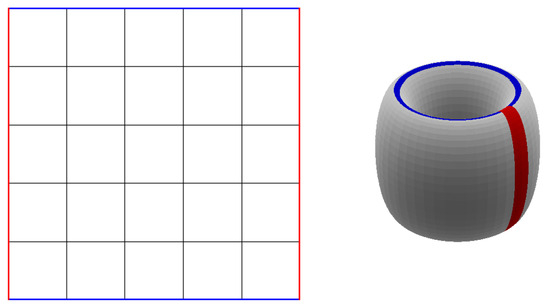
Figure 11.
Visualization of a toroidal bounded lattice. The blue lines represent where the upper and bottom boundaries connect and the red lines the left/right connection.
We run our simulation for a finite number of generations. In each run, we check every cell (by row and column) and apply the GoL rules to update its value in the meta_lattice, and with this, we update the value in the sensor_lattice as follows:
- If the cell in the corresponding position in the meta_lattice is 0 (dead) and a sensor exists in sensor_lattice (i.e., its value is greater than 0), set it to 1 (idle).
- If the cell in the corresponding position in the meta_lattice is 1 (alive) and a sensor exists in sensor_lattice (i.e., its value is greater than 0), set it to 2 (on).
Before proceeding to the next cell, if the sensor is in the on state, check if there exists a random event in its position and detecting radius (n-Moore neighborhood). If this is the case, update its value to 3 (transmitting state) and add 1 to detection_probability (this will be divided between the total of events at the end of the execution) and its corresponding energy consumption, according to its status, to power_consumption (this will be divided by the number of generations at the end of the execution).
In the context of our approach, the boundary conditions are set for the model inner working (i.e., the Game of Life cellular automaton). The evolution of this CA runs independently of the actual WSN. The only physical connection between the two is in the sensor positioning that turns on/off the sensors. Hence, the toroidal shape is only used so that the GoL continues its evolution in time but it is not related to the physical boundaries of the WSN.
Algorithm 4 uses Algorithm 3’s logic for calculating and storing the power consumption and detection probability at different levels of a variable (number of sensors or detection radius of each sensor) in a determined range.
| Algorithm 4: Evolve varying 1 variable |
Let meta_lattice:Array[m][n], sensor_lattice:Array[m][n] Let power_consumption, detection_probability For s = 1, 2,…, sensors For r = 1, 2,…, repetitions For g = 1, 2,…, generations Initialize meta_lattice, sensor_lattice For i = 1, 2,…, m For j = 1, 2,…, n Evolve meta_lattice[i][j] If (Can_detect sensor_lattice[i][j]) Add to detection_probability Add power consumption of sensor_lattice[i][j] Endfor Endfor Endfor Average power_consumption and detection_probability for generations Endfor Average power_consumption and detection_probability for repetitions Endfor Store power_consumption and detection_probability for s sensors |
Algorithm 5 uses Algorithm 3’s logic for calculating and storing the power consumption and detection probability at different levels of two variables (number of sensors and detection radius) in a determined range. We store this value for generating the plots in Results.
| Algorithm 5: Evolve varying 2 variables |
Let meta_lattice:Array[m][n], sensor_lattice:Array[m][n] Let power_consumption, detection_probability For s = 1, 2,…, sensors For er = 1, 2,…, event_radio For r = 1, 2,…, repetitions For g = 1, 2,…, generations Initialize meta_lattice, sensor_lattice For i = 1, 2,…, m For j = 1, 2,…, n Evolve meta_lattice[i][j] If (Can_detect sensor_lattice[i][j]) Add to detection_probability Add power consumption of sensor_lattice[i][j] Endfor Endfor Endfor Average power_consumption and detection_probability for generations Endfor Average power_consumption and detection_probability for repetitions Endfor Endfor Store power_consumption and detection_probability for s sensors and er event_radio |
For reproducibility purposes, we include Table 2 with all the simulation parameters.

Table 2.
Simulation parameters.
7. Results
We now present some relevant results that derive from our proposal of using cellular automata to determine whether the nodes turn on and off instead of a specific activation probability, as conventionally considered in the literature. As we mentioned before, we consider events to occur randomly in the region of interest or according to a GoL pattern similar to the one used to activate the nodes. As such, this scenario can be used when the system administrator has some information regarding the nature of the event and behaves in such a manner that the same pattern can be used in the system design. We evaluate the system performance in terms of the average energy consumption and detection probability of each scenario, varying the number of sensors in the network and their detection range.
First, we study the case where sensors were positioned randomly (following a uniform distribution) and nodes are turning on and off according to different GoL patterns and randomly based on the activation probability,
Then, we consider the following GoL initial configurations that develop in the specific patterns: gliders, Gosper gun, Simkin gun, and period-60 Gosper gun. We compare the GoL-derived patterns to the conventional on/off algorithm. Figure 12 provides a visualization of the sensormaps for two of these patterns.
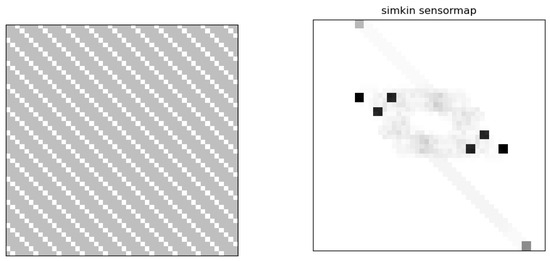
Figure 12.
Glider and Simkin sensormaps.
We can see in Figure 13, that for the case of unlocalized events, i.e., events that occur at any region of the monitored area and are not restricted to the GoL pattern, gliders are the best-performing pattern among the chosen ones, and Simkin the worst, in terms of successful event detection when of the conventional scheme. This is because the coverage (i.e., as observed by their sensormaps in Figure 12) of the former is the widest and that of the latter the narrowest. Indeed, the former covers all the possible events in the area, while the latter can only detect events in very narrow region.
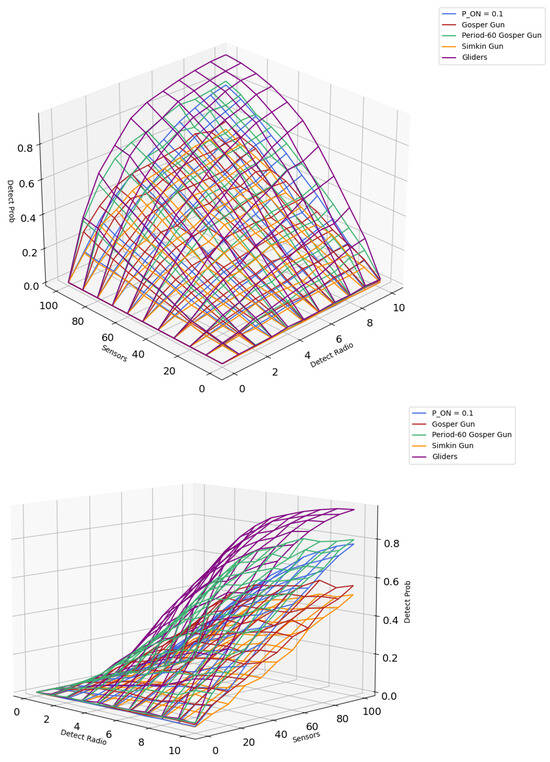
Figure 13.
Probability of detection (unlocalized). In this surface plot, we compare the probability of detection (y-axis) when we differ the number of sensors and the sensor radius. Sensors and events are placed uniformly at random. (Event time is exponentially random in all the experiments).
However, when is used for the conventional scheme (not based on the GoL), it performs better than GoL-based schemes, as seen in Figure 14. This is because nodes are on for longer times and are able to detect many more events, which in turn are not restricted to a certain zone.
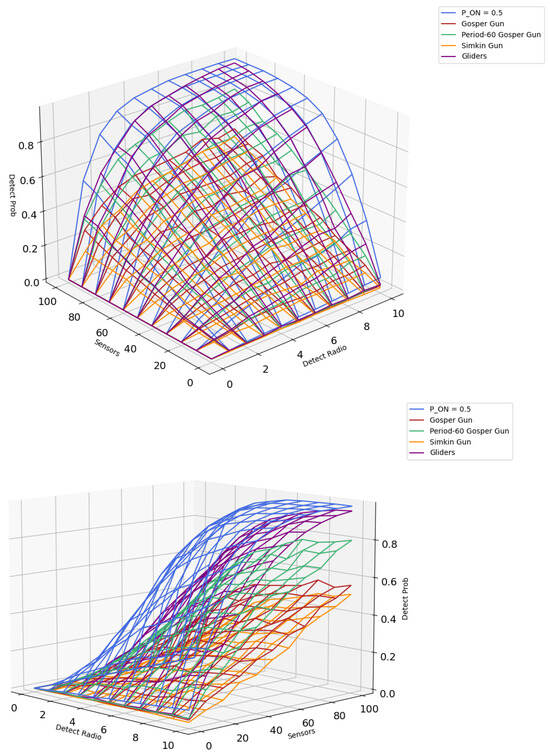
Figure 14.
Probability of detection (unlocalized). In this surface plot, we compare the probability of detection (y-axis) when we differ the number of sensors and the sensor radius. Sensors and events are placed uniformly at random. (Event time is exponentially random in all the experiments).
This is even more pronounced when , as seen in Figure 15. In this case, nodes are almost never turned off and nodes detect almost all events, achieving 100% detection, even with a low number of nodes and a small detection radius.
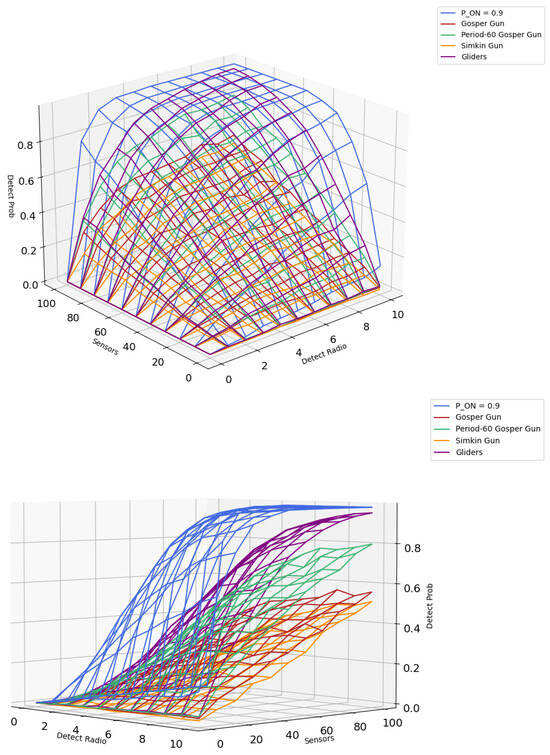
Figure 15.
Probability of detection (unlocalized). In this surface plot, we compare the probability of detection (y-axis) when we differ the number of sensors and the sensor radius. Sensors and events are placed uniformly at random. (Event time is exponentially random in all the experiments).
Regarding the energy consumption in the system, in Figure 16, Figure 17 and Figure 18 we present the results for the unlocalized events for the GoL-based schemes and the conventional scheme with , 0.5, and 0.9. We can see that the Simkin gun has the lowest energy consumption due to its low detection capabilities, and so nodes rarely transmit any packets. With the same logic, gliders consume more energy. Regarding the conventional scheme, we can see that when is high (low), there is also a high (low) energy consumption. In fact, when the system consumes a considerable higher amount compared to any GoL-based scheme, which would render this scheme unsuitable for most applications. For instance consider the case of 60 nodes with a detect radius of eight cells. In these conditions, the glider configuration already achieves a detection probability higher than 0.8, very close to the conventional case with . However, the energy consumption is close to 30 energy units while that of the GoL-based scheme is close to 10 energy units, entailing a much higher system lifetime. As such, we can say that, even in unlocalized events, the GoL would be a better option to consider.
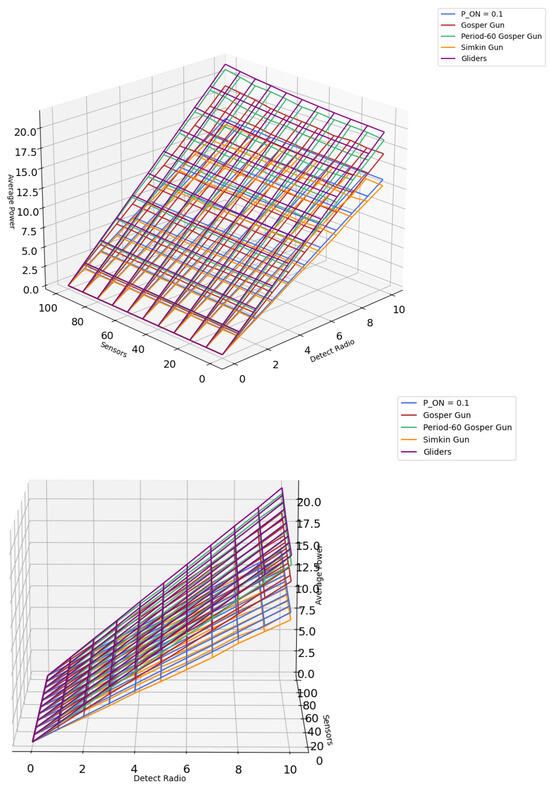
Figure 16.
Energy consumption (unlocalized). In this surface plot, we compare the energy consumption (y-axis) when we differ the number of sensors and the sensor radus. Sensors and events are set uniformly at random in the lattice. For all our experiments we consider , , and .
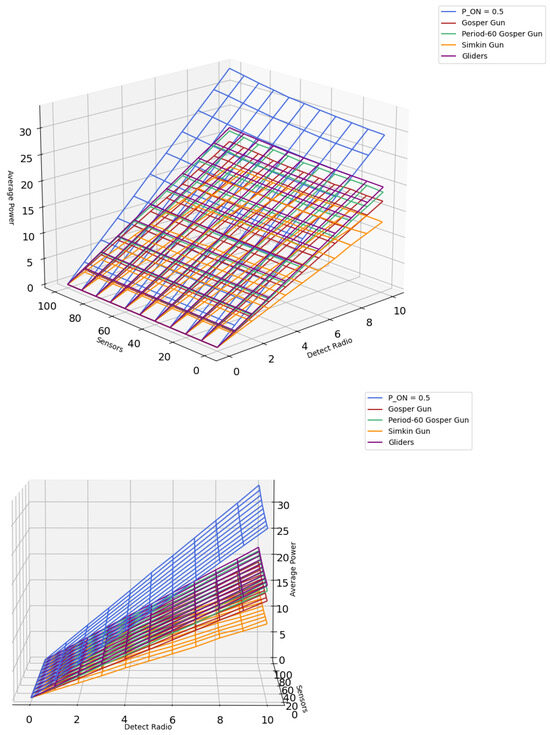
Figure 17.
Energy consumption (unlocalized). In this surface plot, we compare the energy consumption (y-axis) when we differ the number of sensors and the sensor radius. Sensors and events are set uniformly at random in the lattice. For all our experiments we consider , , and .
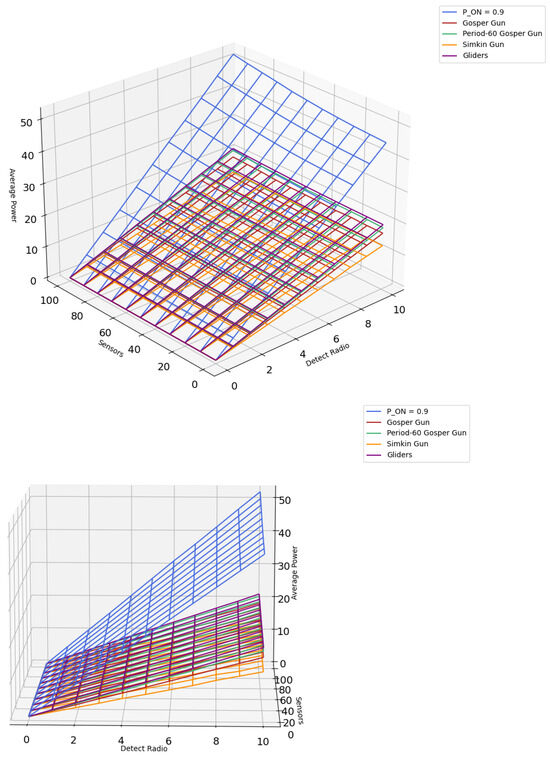
Figure 18.
Energy consumption (unlocalized). In this surface plot, we compare the energy consumption (y-axis) when we differ the number of sensors and the sensor radius. Sensors and events are set uniformly at random in the lattice. For all our experiments we consider , , and .
Now, we evaluate the system performance when localized events occur in the region of interest. This would be the case where GoL-based schemes are much better suited, since events can only occur where the cellular automata are developing. In Figure 19, Figure 20 and Figure 21, we show the results for the GoL schemes and the conventional scheme with , , and , respectively. We can observe that for all GoL-based schemes, the detection probability has significantly increased compared to the unlocalized case. Also, the period-60 Gosper gun achieves the highest detection probability, given its highly localized pattern. Additionally, the conventional scheme with still achieves the highest detection radius, but it is not much higher than that of the already-mentioned GoL pattern.
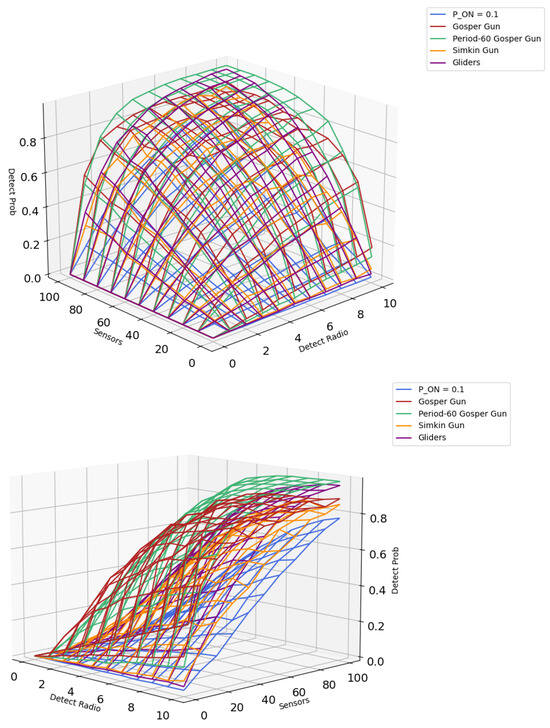
Figure 19.
Probability of detection (localized). In this surface plot we compare the probability of detection (y-axis) when we differ the number of sensors and the sensor radius. Sensors and events are placed only in the area where the GoL patterns act (sensormap). The performance of every pattern improves.
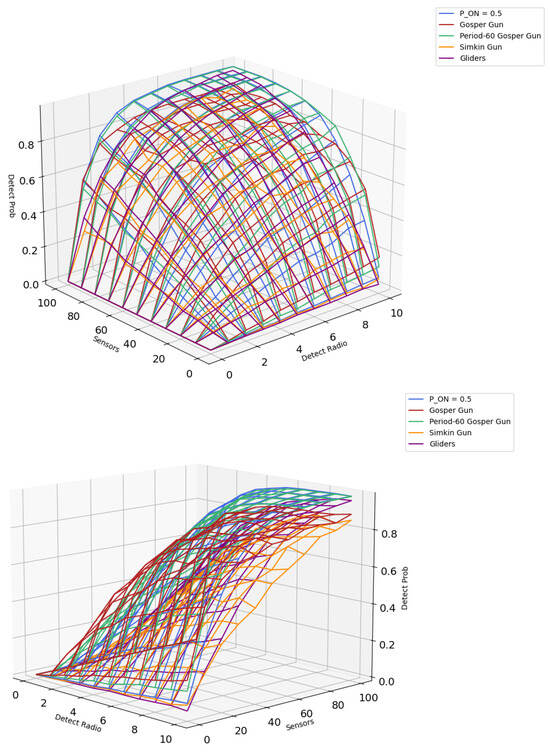
Figure 20.
Probability of detection (localized). In this surface plot we compare the probability of detection (y-axis) when we differ the number of sensors and the sensor radius. Sensors and events are placed only in the area where the GoL patterns act (sensormap). The performance of every pattern improves.
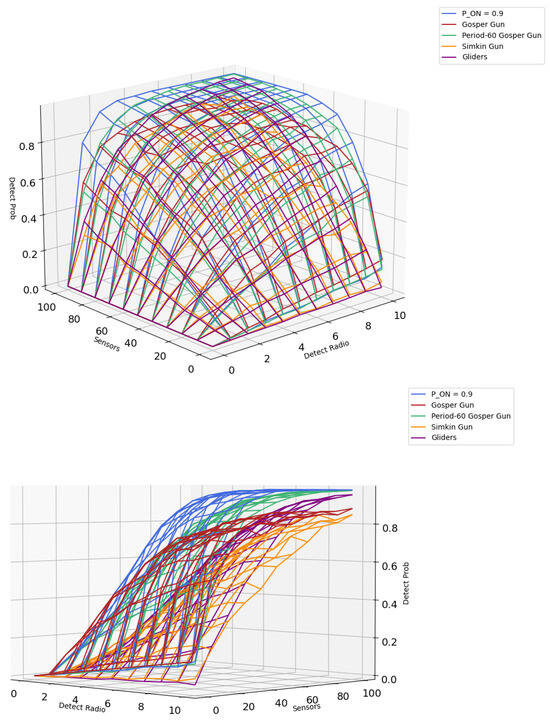
Figure 21.
Probability of detection (localized). In this surface plot we compare the probability of detection (y-axis) when we differ the number of sensors and the sensor radius. Sensors and events are placed only in the area where the GoL patterns act (sensormap). The performance of every pattern improves.
In terms of energy consumption, Figure 22, Figure 23 and Figure 24 show the results for the GoL schemes and the conventional scheme with , , and respectively. We observe that the GoL-based schemes now consume more energy compared to the unlocalized events, since now nodes detect many more events and transmit packets accordingly, which entails a higher energy consumption. However, the Simkin gun consumes the lowest energy levels, even when the conventional scheme is set to . This reflects the benefits of using cellular automata to set the on/off schedule, since the GoL scheme that has the lowest event detection also achieves the lowest energy consumption, outperforming the conventional scheme. Conversely, when is used in the conventional scheme, the energy consumption is much higher than in any other scheme, making this configuration unsuitable for any practical scenario.
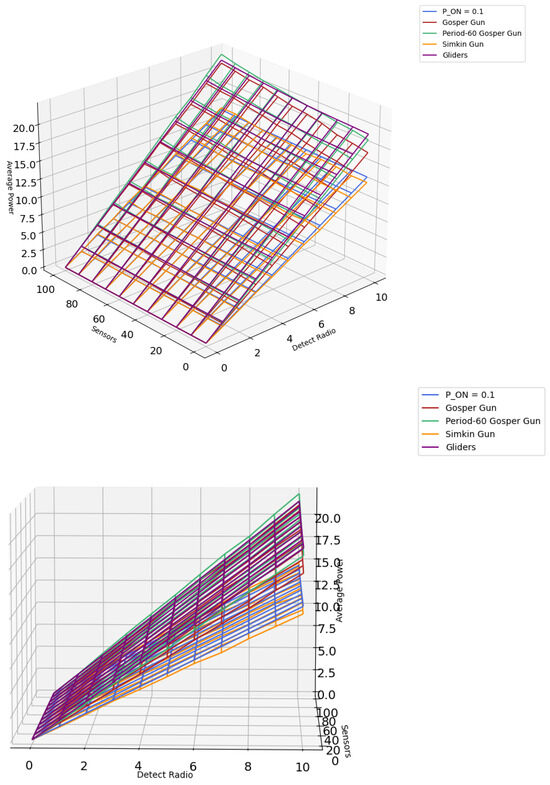
Figure 22.
Energy consumption (localized). In this surface plot, we compare the energy consumption (y-axis) when we differ the number of sensors and the sensor radius. Events are set only where the GoL patterns act. Energy consumption is very similar between the localized and unlocalized schemes.
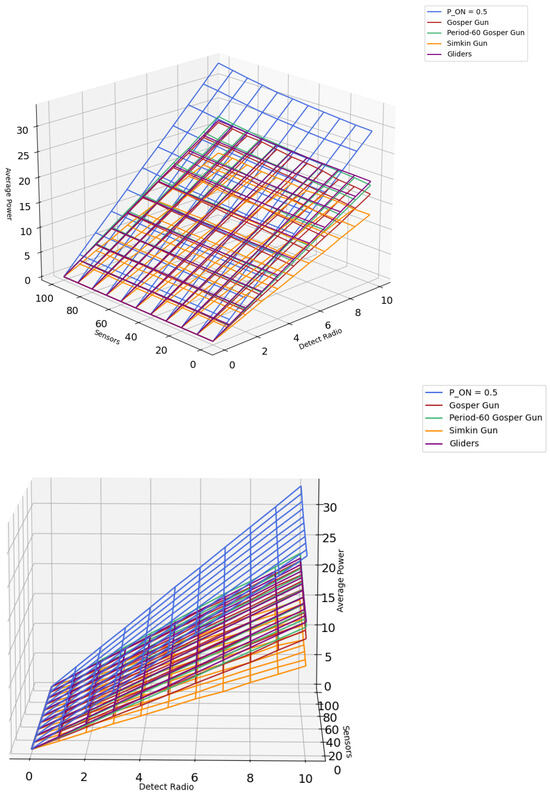
Figure 23.
Energy consumption (localized). In this surface plot, we compare the energy consumption (y-axis) when we differ the number of sensors and the sensor radius. Events are set only where the GoL patterns act. Energy consumption is very similar between the localized and unlocalized schemes.
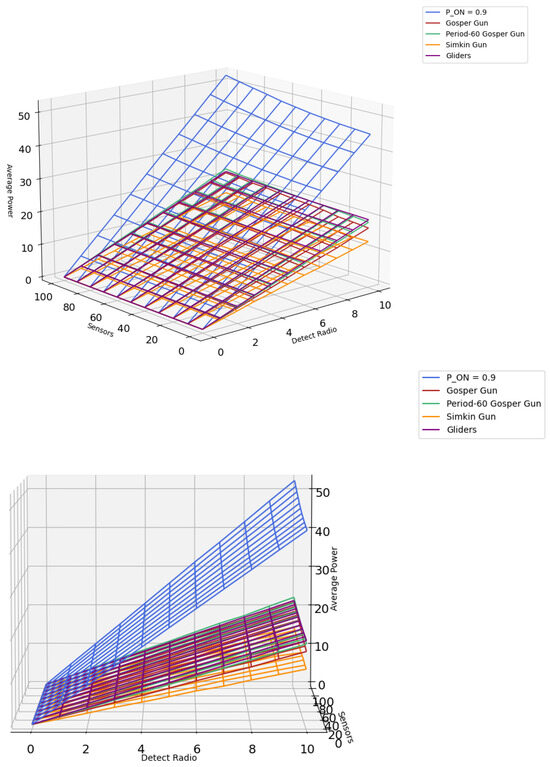
Figure 24.
Energy consumption (localized). In this surface plot, we compare the energy consumption (y-axis) when we differ the number of sensors and the sensor radius. Events are set only where the GoL patterns act. Energy consumption is very similar between the localized and unlocalized schemes.
From this, we can see that gliders can be used for events that can occur anywhere or ones where we do not know their pattern in advance, while Simkin is best suited for events that are confined to narrow regions. When events were set only in sites where each pattern evolves, Gosper gun period-60 was as good as gliders, and even Simkin was better than a random initial configuration. As gliders covers almost the entire lattice, this behavior is expected. Also, localized events avoid setting up sensors where the GoL pattern never occurs, which improves each pattern considerably.
For all these points we considered the mean of the repetitions. We add a confidence interval for a representative case in Figure 25.
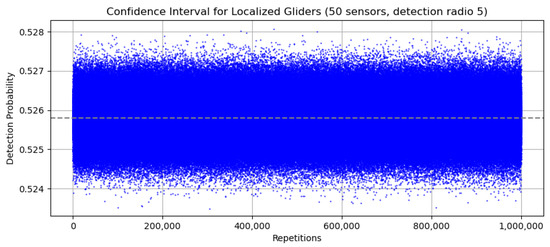
Figure 25.
We show the confidence interval for the detection probability of the localized glider pattern with 50 sensors and a detection radius of 5.
8. Conclusions
Cellular automata for Wireless Sensor Networks represent an opportunity to merge two different but related areas. In the common WSN paradigm, sensors are turned on/off given a probability, but our proposal uses the evolution of a well-known CA, that is, the Game of Life. We use a meta-lattice approach because it would be impractical and costly to have an area fully covered by sensors and use this evolution as a turning on/off alternative with a common and natural mapping; alive cell = sensor on, dead cell = sensor off.
Compared to the traditional approach, we found that the Game of Life scheme yields better results when events are localized in terms of detection probability and also in terms of energy consumption. Even in unlocalized events, GoL outperforms the conventional scheme considering the combined performance of detection probability and energy consumption. This could be a more appropriate method for setting up and turning on sensors within a WSN. The advantage would be case-by-case, with interdisciplinary knowledge about physical phenomena from experts in biology, ecology, etc., and computer scientists for choosing the best pattern for the events of interest. In case that the phenomenon to monitor is not known at all, a conventional on/off scheme would be a better option. However, in the majority of cases, the monitored events are somehow known, and a particular GoL pattern can be used in this case, effectively reducing energy consumption and increasing the detection probability.
We evaluate representative GoL patterns in this work, but there are countless known patterns and more being discovered every year, and it would require much more research in the area to try them all. In fact, some new patterns can be developed explicitly to be used in WSN applications that better suit the environment and applications. We selected representative patterns that serve as a basis and examples for more sophisticated and larger patterns. Future work could be testing the meta_lattice model with specific phenomena and other models of cellular automata and even generating our own patterns adapted to the specific phenomena.
We include a simple metric for System Energy Lifetime (Figure 26), considering sensors with an initial energy of 100 units, which decreases each time they activate, transmit, or stay idle. As future work we can formalize this along with false negatives, noise, and sensor faults to provide a more practical oriented approach. Hardware testing with actual sensors can also be considered to provide a more grounded study.
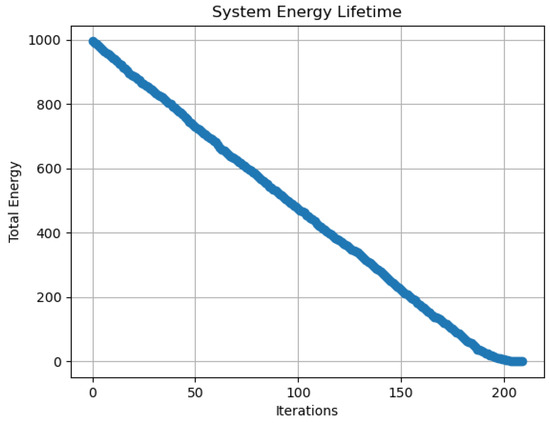
Figure 26.
System Energy Lifetime. Considering a 10 × 10 lattice with 10 sensors with an initial energy of 100 units, as we repeat the experiment of randomly turning them on/off and detecting random events, the total system energy lasts 200 iterations. The patterns we selected have periods of 4, 30, 60, and 120, respectively, so the meta-lattice can work even with a small system.
In many practical problems, the interest does not lie in the details of the configuration, but rather in certain aggregate properties, such as the density of ones (denoted as ) at iteration n; specifically, starting from an initial density of ones, we want to know the resulting configuration after several interactions. For a given CA, the difficulty of finding the density depends on the transition function [25]. In some sense, the transition function resembles a finitely dimensional dynamical system in the neighborhood of a hyperbolic fixed point. For these systems, it is observed that the orbits that begin in a stable manifold converge to a stable fixed point (hyperbolic fixed points are common in this type of dynamical systems) very quickly. Figure 27 shows semilogarithmic plots of as a function of n. The value has been taken as the maximum steady state value; in this case, the graph follows closely a straight line, suggesting that it approaches a fixed point exponentially. Then, it is possible to conjecture a mathematical property that could be demonstrated, trying to show the asymptotic behavior of the dynamic system.
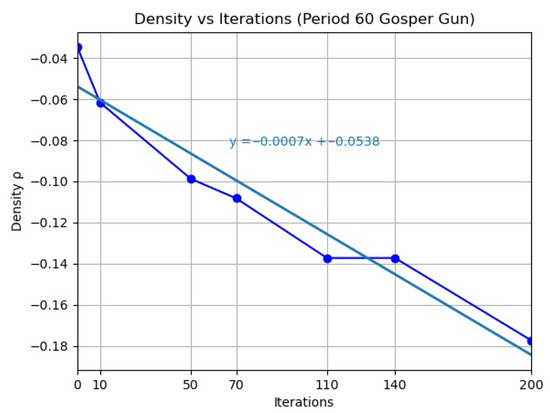
Figure 27.
In this figure we consider the density of ones of the total cells in the lattice at each iteration. Plotted in a semilogarithmic scale and subtracting the maximum steady state value of each, we can adjust with function ().
Conjecture 1. For certain CA, the density of ones after n asymptotical iterations has the form in a semilogarithmic space.
Moreover, when we depict energy consumption versus lattice size, it shows an exponential decay, see Figure 28. This leads us to believe that there is a trade-off between energy consumption and the size of the lattice, giving rise to a second conjecture that could be demonstrated.
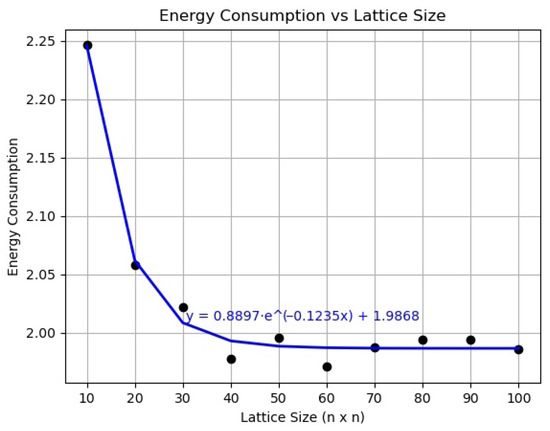
Figure 28.
In this figure we plot the lattice size vs. energy consumption. We adjust with function ().
Conjecture 2. In our system, there exists a relation (trade-off) between the energy consumption and the size of the lattice, which appears to asymptotically converge to a state of minimum energy consumption. The latter in turn is related to the probability of detection (given a initial configuration of the cellular automaton).
Finally, there are other mathematical properties that could be demonstrated, such as the relation between the initial GoL configuration and how this affects energy consumption.
Author Contributions
Conceptualization, G.T.-C. and J.C.C.-E.; Writing—original draft, H.I.F.-C.; Writing—review & editing, M.E.R.-A. All authors have read and agreed to the published version of the manuscript.
Funding
This work was partially funded by IPN SIP project no 20250076.
Data Availability Statement
The original contributions presented in this study are included in the article. Further inquiries can be directed to the corresponding authors.
Conflicts of Interest
The authors declare no conflicts of interest.
References
- Fascista, A. Toward Integrated Large-Scale Environmental Monitoring Using WSN/UAV/Crowdsensing: A Review of Applications, Signal Processing, and Future Perspectives. Sensors 2022, 22, 1824. [Google Scholar] [CrossRef]
- Suhag, D.; Gaur, S.; Mohapatra, A. A proposed scheme to achieve node authentication in military applications of wireless sensor network. J. Stat. Manag. Syst. 2019, 22, 347–362. [Google Scholar] [CrossRef]
- Zhang, Q. Environment Pollution Analysis on Smart Cities Using Wireless Sensor Networks. Strateg. Plan. Energy Environ. 2022, 42, 239–262. [Google Scholar] [CrossRef]
- Rafiee, P.; Ju, Z.; Doroslovački, M. Adaptive ON/OFF Scheduling to Minimize Age of Information in an Energy-Harvesting Receiver. IEEE Sens. J. 2024, 24, 3898–3911. [Google Scholar] [CrossRef]
- Wu, G.; Fang, Y.; Xu, J.; Feng, Z.; Cui, S. Energy-Efficient MIMO Integrated Sensing and Communications with On–Off Nontransmission Power. IEEE Internet Things J. 2024, 11, 12177–12191. [Google Scholar] [CrossRef]
- Toledo, K.; Gómez, J.T.; Dressler, F.; Julia Fernández-Getino García, M. Energy-Aware Cooperative Spectrum Sensing Under Ignorance on Internet of Mobile Things. IEEE Open J. Commun. Soc. 2024, 5, 5323–5336. [Google Scholar] [CrossRef]
- Singh, S.; Chawla, M.; Prasad, D.; Anand, D.; Alharbi, A.; Alosaimi, W. An Improved Binomial Distribution-Based Trust Management Algorithm for Remote Patient Monitoring in WBANs. Sustainability 2022, 14, 2141. [Google Scholar] [CrossRef]
- Gardner, M. Mathematical Games. Sci. Am. 1970, 223, 120–123. [Google Scholar] [CrossRef]
- Vayadande, K.; Pokarne, R.; Phaldesai, M.; Bhuruk, T.; Patil, T.; Kumar, P. Simulation of Conway’s Game of Life Using Cellular Automata. Simulation 2022, 9, 327–331. [Google Scholar]
- Sgantzos, K.; Grigg, I.; Al Hemairy, M. Multiple Neighborhood Cellular Automata as a Mechanism for Creating an AGI on a Blockchain. J. Risk Financ. Manag. 2022, 15, 360. [Google Scholar] [CrossRef]
- Bakhteri, R.; Cheng, J.; Semmelhack, A. Design and Implementation of Cellular Automata on FPGA for Hardware Acceleration. Procedia Comput. Sci. 2020, 171, 1999–2007. [Google Scholar] [CrossRef]
- Ninagawa, S.; Martinez, G. Visualization of the Computation Process of a Universal Register Machine. arXiv 2021. [Google Scholar] [CrossRef]
- Getz, W.; Salter, R. Extending Conway’s Game of Life. BioRxiv 2022. [Google Scholar] [CrossRef]
- Yabcznski, E.; Brante, G.; Souza, R.; Montejo-Sánchez, S. Energy Efficient Probabilistic Switching ON–OFF Operation in Multiantenna Cooperative Wireless Sensor Networks. Sensors 2021, 21, 2937. [Google Scholar] [CrossRef] [PubMed]
- Oh, J.; Lee, D.; Lakew, D.; Cho, S. DACODE: Distributed adaptive communication framework for energy efficient industrial IoT-based heterogeneous WSN. ICT Express 2023, 9, 1085–1094. [Google Scholar] [CrossRef]
- Srinidhi, J.; Aasish, A.; Kumar, N.; Ramakrishnaiah, T. WSN smart irrigation system and weather report system. IOP Conf. Ser. Mater. Sci. Eng. 2021, 1042, 012018. [Google Scholar] [CrossRef]
- Rahmani, A.; Ali, S.; Yousefpoor, M.; Yousefpoor, E.; Naqvi, R.; Siddique, K.; Hosseinzadeh, M. An area coverage scheme based on fuzzy logic and shuffled frog-leaping algorithm (sfla) in heterogeneous wireless sensor networks. Mathematics 2021, 9, 2251. [Google Scholar] [CrossRef]
- Shahid, J.; Muhammad, Z.; Iqbal, Z.; Almadhor, A.; Javed, A. Cellular automata trust-based energy drainage attack detection and prevention in Wireless Sensor Networks. Comput. Commun. 2022, 191, 360–367. [Google Scholar] [CrossRef]
- Banerjee, I.; Chanak, P.; Rahaman, H. CCABC: Cyclic Cellular Automata Based Clustering For Energy Conservation in Sensor Networks. arXiv 2011, arXiv:1109.2430. [Google Scholar] [CrossRef]
- Sen, N.; Banerjee, I. CAWS—Security Algorithms for Wireless Sensor Networks: A Cellular Automata Based Approach. arXiv 2012, arXiv:1209.0286. [Google Scholar]
- Maity, I.; Bhattacharya, G.; Das, S.; Sikdar, B. A cellular automata based scheme for diagnosis of faulty nodes in WSN. In Proceedings of the 2011 IEEE International Conference on Systems, Man, and Cybernetics, Anchorage, AL, USA, 9–12 October 2011; pp. 1212–1217, ISSN 1062-922X. [Google Scholar]
- Fu, X.; He, X.; Yang, Y. Invulnerability Analysis of Wireless Sensor Networks based on Cellular Automata. In Proceedings of the 2020 IEEE International Conference On Human-Machine Systems (ICHMS), Rome, Italy, 7–9 September 2020; pp. 1–4. [Google Scholar]
- Hoffmann, R.; Désérable, D.; Seredyński, F. Cellular automata rules solving the wireless sensor network coverage problem. Nat. Comput. 2022, 21, 417–447. [Google Scholar] [CrossRef]
- Reyes, J.; García, F.; Lárraga, M.; Gómez, J.; Orozco-Barbosa, L. Game of Sensors: An Energy-Efficient Method to Enhance Network Lifetime in Wireless Sensor Networks Using the Game of Life Cellular Automaton. IEEE Access 2022, 10, 129687–129701. [Google Scholar] [CrossRef]
- Fukś, H.; Soto, J. Exponential convergence to equilibrium in cellular automata asymptotically emulating identity. arXiv 2013, arXiv:1306.1189. [Google Scholar] [CrossRef]
Disclaimer/Publisher’s Note: The statements, opinions and data contained in all publications are solely those of the individual author(s) and contributor(s) and not of MDPI and/or the editor(s). MDPI and/or the editor(s) disclaim responsibility for any injury to people or property resulting from any ideas, methods, instructions or products referred to in the content. |
© 2025 by the authors. Licensee MDPI, Basel, Switzerland. This article is an open access article distributed under the terms and conditions of the Creative Commons Attribution (CC BY) license (https://creativecommons.org/licenses/by/4.0/).